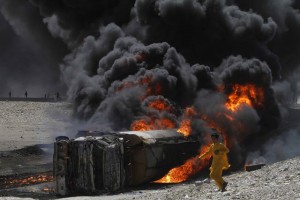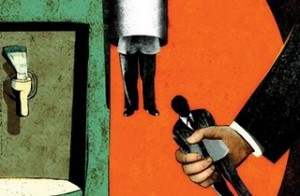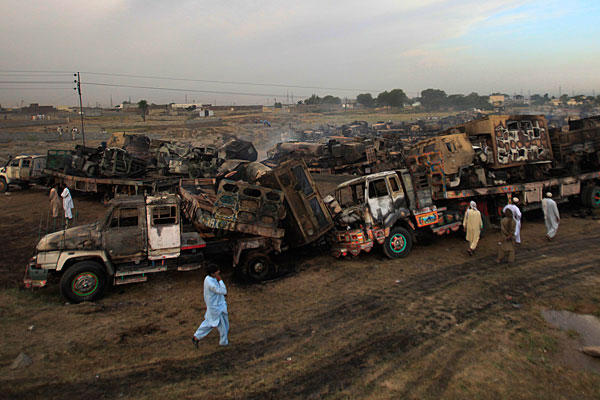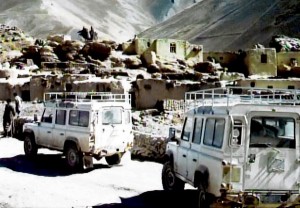The Most Dangerous Occupation
The group of young men standing outside the Walmart warehouse, clustered together and pointed excitedly to an advertisement in the newspaper. “Fifty bucks an hour for truck drivers,” said one. “This sure beats making deliveries for chain stores.”
“Believe me,” said Julio Munoz. “You don’t want the job. The risks are too great.”
The advertisement was for truck drivers in Afghanistan. Julio had spent ten months on the war front, hauling freight for the development of a hydroelectric plant under a private, civilian contract. “It’s insane out there. You get no protection. The military won’t even drive the roads they send the truck drivers on without a convoy, and they have weapons. We don’t.”
He went on to tell about an evening when he received a notice to deliver freight along a stretch of highway that had been raided several times over a period of a few weeks. The buddies he’d made among the military were sympathetic. “One of them gave me a gun,” he said. “It didn’t seem like much but it felt better than having nothing at all.”
He claimed he had only driven about ten miles when the truck ahead of him exploded. “It was so sudden and the concussion so great,” he said, “I lost control of my truck.” It turned over and skidded half-way across the road, coming to rest dangerously close to the burning vehicle. “I could hear the guns rattling off. I could hear the shouts and the sounds of running feet.” The overturned truck had thrown him to the floor boards. “I stayed there, cradling the gun in my hands. I figured there were probably too many for me to do much damage, but at least they wouldn’t take me alive.”
Fortunately for Julio, the raiders never looked inside the cab of the truck. After several long, painful hours, silence returned and Julio limped from the truck back to the encampment.
Julio was one of the lucky ones. His injuries were minor. He lived to return to the United States and take a job as a delivery driver. According to Simon Rogers of The Guardian, UK., the number of civilian deaths in Afghanistan rose from 929 in 2006 to 6,982 with the largest toll in 2009 with 2, 412 reported deaths. An estimated 1,600 of the victims have been American and other foreign civilian workers. The casualty list includes truck drivers, translators, domestic work crews, diplomatic aides and humanitarian efforts. According to the federal news radio, contractor deaths, which had represented only four percent of war fatalities for Afghanistan and Iraq in 2003, has jumped to forty percent for the years 2008-2009. Reporting for the second quarter of 2010, more civilian contractors have died performing duties in Afghanistan this year than military personnel. An estimated 35,000 have been wounded since 2003.
According to a Government Executive Report, more contractors were killed in Iraq and Afghanistan than U.S. troops during the first six months of 2010, says a George Washington University law professor.
“Contractors supporting the war effort today are losing more lives than the U.S. military waging these wars,” wrote Steven L. Schooner, co-director of the Government Procurement Law Program at The George Washington Law School, and Collin D. Swan, a student there. Their article appeared in the September issue of Service Contractor magazine, a quarterly publication of the Professional Services Council, an industry group.
The data show that in the first half of 2010, contractor fatalities in Afghanistan for the first time exceeded troop fatalities — 232 and 195, respectively. Contractor deaths in Iraq surpassed military deaths there beginning in 2009. Between January 2009 and June 2010, there were 204 contractor deaths and 188 troop deaths in Iraq.
The war in Afghanistan has been taken to a far more personal level than combatants exposing themselves to the line of fire. In a September 16th, 2009 article by the Telegraph, UK, “Terrorist leaders say a concerted campaign of abductions targeting thousands of expatriates including Britons was justified by the detention of Muslims in prisons such as Guantánamo Bay.” Citing a website written by Mustafa Hamid, also known as Abu Walid al Masri, it quoted that the kidnaping of a British journalist, Stephen Farrell earlier that month was a message to “let the games begin.”
The article on a jihadist website, entitled “The US Soldier in Afghanistan – the first step for the release of all prisoners of the war on terror”, said the capture of a US paratrooper in June should mark a precedent for abducting Western civilians.
Masri argued that the US had “changed the rules of the game” by not distinguishing between civilians and combatants and by torturing inmates. He said it was now time for the fighters to “change the rules” and “accept the principle approved and implemented by the enemy – the abduction of civilians who have nothing to do with the battle”.
He wrote that soldiers and civilians from foreign countries were fair targets and said “the Taliban should do as its enemy does” and take prisoners from the streets.
The statements by Masri have primarily gone unnoticed by a public whose concentration has been on military deployment. The area of concern is changing rapidly. In August of 2010, a ten-member international medical team — six Americans, two Afghans, a Briton and a German — were attacked while returning from a two-week trek into the wilds of Nuristan province, where they had provided free care to the impoverished residents of a remote mountain valley. It was the deadliest attack and the second largest loss of American civilians in a single attack during the nearly nine year long war.
According to the August 9th., 2010 article, “Will Aid Workers’ Killings End Civilian Surge?” written by Jason Motlagh for “Time”:
“The Taliban recently issued a revised code of conduct for its fighters, exhorting them to protect civilians, except for those who cooperate with Afghan security forces or foreign armies. Civilians are nonetheless dying in record numbers, mostly as a result of Taliban operations. And this is hardly the first time the movement has attacked foreign civilian aid workers. In August 2008, four workers with the International Rescue Committee were shot dead in a Taliban ambush outside of Kabul. Last month, gunmen and suicide bombers in the northern province of Kunduz stormed the offices of U.S.-based development organization DAI, killing at least five people. Once allowed to operate with a degree of immunity, aid workers now face a dramatically increased threat of kidnaping and assassination.”
There are many who feel the escalated attacks against civilians could have been prevented. News correspondents relate unchecked brutalities by American soldiers against Afghan villagers, increasing hostilities in an arena already riddled with distrust.
According to Army charging documents reported by The Post’s Craig Whitlock, five members of a Stryker brigade based in Kandahar province murdered three Afghan civilians in cold-blooded attacks between January and May. Seven other servicemen have been charged with related crimes, including hashish use, obstruction of the investigation, and participation in an attack on a whistleblower. The soldiers are accused of detonating grenades as a pretext for firing on randomly chosen civilians. The troops are also alleged to have dismembered and photographed corpses.
The Washington Post writes that, “One member of the soldiers’ platoon responded to this depraved behavior by reporting it in an e-mail chat with his father. The father, former Marine Christopher Winfield, said he responded immediately, attempting to contact a range of authorities even though it was a Sunday. Mr. Winfield left messages on the 24-hour hotline of the Army inspector general; the office of Sen. Bill Nelson (D-Fla.); and the Army’s criminal investigations division. He also said he spoke with a sergeant at the command center of Joint Base Lewis-McChord in Washington state, where the Stryker unit is based. He was told nothing could be done unless his son reported to superiors.
Tragically, two more killings took place after those phone calls — and Mr. Winfield’s son, Adam Winfield, was charged in the shooting of an Afghan cleric that took place on May 2, 2 1/2 months after his father made the phone calls. Adam Winfield’s attorney says that he was ordered to fire on the cleric and that he aimed high and missed; the other accused soldiers also deny wrongdoing.”
While aerial strikes by “friendly fire” was considered the leading cause of civilian deaths in the early part of the war – after U.S. warplanes strafed [with AC-130 gunships] bombed the farming village of Chowkar-Karez, 25 miles north of Kandahar on October 22-23rd 2002,killing at least 93 civilians, a Pentagon official said, “the people there are dead because we wanted them dead.” The reason? They sympathized with the Taliban. When asked about the Chowkar incident, Rumsfeld replied, “I cannot deal with that particular village.” – deliberate attacks by Afghanistan insurgents have spiked.
According to Yahoo News, “The bad news for the American war effort in Afghanistan is that civilian casualties are up nearly a third, according to a newly released United Nations report. The less bad news, at least for the coalition effort, is that NATO forces are killing far fewer noncombatants. And the worse news is that the Taliban have been making up the difference — and then some.”
While contractors are often well-paid, their efforts on foreign soil not only go unnoticed by the public, but are often uncompensated when their tenure in Afghanistan results in injury or death. The insurance companies responsible for covering treatment under tax-funded policies, primarily American International Group (AIG) routinely dismiss their claims. Unlike wounded soldiers, who are offered health care, rehabilitation and support services by the military, the civilians have to battle a federally supervised insurance system marked by high costs and excessive delays, an investigation by the Los Angeles Times, ABC News and ProPublica has found.
“It’s almost like we’re this invisible, discardable military. Once we’ve done our jobs, they can actually sidetrack us and not worry about us anymore,” said Tim Newman, a sheriff’s deputy from South Carolina who lost his leg to a roadside bomb in Baghdad. Once back home, he fought an insurance company for a year to get a prosthetic leg that his doctors recommended.
Nor have the insurance companies been very sympathetic with the mental well-being of returning civilian contractors. Their time in a war zone was strenuous. An article in Propublica covers the suicide of an exterminator who was contracted for pest control on the military bases in Iraq. There, he found himself killing disease-carrying flies and rabid dogs, dodging mortars and huddling in bomb shelters.
Wade Dill, a Marine Corps veteran, was a different man when he came back for visits here, his family said: moody, isolated, morose. He screamed at his wife and daughter. His weight dropped. Dark circles haunted his dark brown eyes.
Three weeks after he returned home for good, Dill booked a room in an anonymous three-story motel alongside Interstate 5. There, on July 16, 2006, he shot himself in the head with a 9 mm handgun. He left a suicide note for his wife and a picture for his daughter, then 16. The caption read: “I did exist and I loved you.”
More than three years later, Dill’s loved ones are still reeling, their pain compounded by a drawn-out battle with an insurance company over death benefits from the suicide. Barb Dill, 47, nearly lost the family’s home to foreclosure. “We’re circling the drain,” she said.
While suicide among soldiers has been a focus of Congress and the public, relatively little attention has been paid to the mental health of tens of thousands of civilian contractors returning from Iraq and Afghanistan. When they make the news at all, contractors are usually in the middle of scandal, depicted as cowboys, wastrels or worse.
No agency tracks how many civilian workers have killed themselves after returning from the war zones. A small study in 2007 found that 24 percent of contract employees from DynCorp, a defense contractor, showed signs of depression or post-traumatic stress disorder, or PTSD, after returning home. The figure is roughly equivalent to those found in studies of returning soldiers.
In the meantime, overseas insurance agencies are having a field day. For Emil Hatabah, of Amman, Jordan, the war in Iraq became a business opportunity. As AIG’s chief representative in Jordan, he was responsible for coordinating the care for hundreds of Iraqis who had been injured while working under contract for U.S. troops as linguists, truck drivers and other jobs.
He fulfilled his functions by sending business to himself, his friends and business associates, according to interviews and records. Hatabah created his own air ambulance service in July 2006, a company called Arab Assist, which AIG hired to transport injured patients from Iraq to Jordan, records show.
“They needed someone who has lots of connections. I’m a doctor with lots of connections,” Hatabah said during an interview at a hotel on a street crowded with hospitals and medical offices in Amman.
According to T. Christian Miller, writer for Propublica, which coordinated an investigation along with the Los Angeles Times, Hatabah sent scores of interpreters and other Iraqi hires to a Jordanian hospital called Al Khalidi, where the chief of the intensive care unit was a business partner and college friend, Nael Abu Khaff. He called it the best hospital to treat them. While they were waiting for care, Hatabah had the interpreters stay at hotels owned by friends, he said.
In an interview at Al Khalidi hospital, Abu Khaff confirmed his business dealings with Hatabah, but said that his hospital was chosen to care for the patients because it was one of the best in Jordan.
Colleen Driscoll, a former official for defense contractor L-3, questioned Hatabah’s choices. For instance, Al Khalidi hospital is a well-respected local institution, but it has not been accredited by the U.S.-based Joint Commission International–the gold standard certification held by other Jordanian hospitals.
Hatabah also placed interpreters with no legs in hotels that had no handicapped access, Driscoll said, and their prosthetics were heavy and fit poorly.
“Hatabah was a businessman. It was all about making money,” Driscoll said.
Hatabah estimates he has overseen the care of around four hundred civilians from Iraq and a handful of other small countries around Jordan. According to Hatabah, he works under a mutual understanding with AIG, which pays him a certain percentage fee for each patient. He declined to reveal specifics, but said he made at most about $100,000 a year working for AIG.
Jordanian doctors who reviewed medical records for some of the patients questioned some charges as high. The cost of most medical procedures in Jordan is set by a standardized fee schedule issued by the local medical association.
One record indicates that AIG paid $29,105 for two surgeries to remove stitches and other “medical expenses” for a patient whose care was being coordinated by Hatabah. Jordanian doctors who reviewed the bill said such charges would normally amount to around $3,500.
“They act like a team and they want to manage all this number of patients. This makes you suspicious,” said one doctor, who did not want to be identified for fear of offending AIG.
“We were the provider of medical treatment to these patients. I’m not an insurance doctor,” Abu Khaff said.
Hatabah also negotiated with Jordan’s immigration authorities to arrange for their visas, worked with local banks to set up accounts for the interpreters and obtained rehabilitation therapy and prosthetic devices. For his services, his company can seek reimbursement under a U.S. law known as the War Hazards Compensation Act.
The Act, passed in the 1940s, allows insurers to seek payment from the Labor Department for medical costs and disability payments associated with combat-injured civilian contractors. It also provides companies an additional 15% to pay for the cost of handling the claim.
As of May 2009, the department had paid AIG $5.7 million for 77 claims, according to documents released under the Freedom of Information Act. It is not clear why AIG has submitted so few claims for reimbursement, given that hundreds of contractors have been injured or killed in combat. AIG has declined to answer specific questions.
The insurance system for civilian contractors has generated profits for the providers, primarily AIG, the war zone’s dominant player. Insurers collected more than $1.5 billion in premiums paid by U.S. taxpayers and have earned nearly $600 million in profit, according to congressional investigators.
A military audit deemed AIG’s premiums “unreasonably high.”
Insurance companies initially rejected 44 percent of claims from contractors involving serious injuries and more than half of all claims related to psychological stress, records show. As a result, civilians maimed or traumatized in the war zone often must wage lengthy court battles for medical care and benefits.
The high denial rate is partly due to government rules that give insurers only 14 days to decide the validity of a claim. Insurers often reject first and investigate later.
Those case-by-case investigations are usually resolved through mediation. When the two sides can’t agree — as has happened in more than 1,000 cases — the dispute winds up in court. Workers win such appeals in 75 percent of cases, records show, but the process can last months or years.
Civilian workers, taken from the ranks of desperate families struggling to increase their income beyond poverty level, are sent to the towns and cities destroyed by American war for the noble purpose of rebuilding them. They are sent with no counseling, no weapons, no protection, no guarantees for their future. They return as casualties of war, in body bags, with missing limbs, their minds anguished, their hearts hollow. They receive no hero’s welcome, no parties, no banners, no medals of honor, no quality care. They are signaled out as the targets by a relentless enemy that has decided to take war to the next level; avenging Afghan civilian casualties by attacking foreign civilians. The civilian truck driver, the linguist, the clean up crew, the humanitarian aid worker have become the throwaway citizen, their worth as human beings surrendered in the name of profit.
http://www.propublica.org/article/injured-contractors-the-other-victims-of-battlefield-stress-224
http://www.washingtonpost.com/wp-dyn/content/article/2010/09/21/AR2010092105282.html
http://www.govexec.com/story_page.cfm?articleid=46163&dcn=todaysnews
http://www.time.com/time/world/article/0,8599,2009399,00.html#ixzz10IhnxYQV
http://www.guardian.co.uk/news/datablog/2010/aug/10/afghanistan-civilian-casualties-statistics
http://www.google.com/hostednews/ap/article/ALeqM5hvWEqwq3CrRvaQCmt21MfoYhjZJQD9ID1AQ00




You don’t have to leave the country to be a throw away citizen. Just get injured on the job in a state where they’ve changed the laws to benefit the corporations.
Excellent coverage, K. No wonder people still love the military; they get screwed royally.
Hi Space Eagle. Welcome back. While researching for the article, it did occur to me that corporate law has pretty much made us all throw-away citizens. However, since i was covering the subject of citizens hired to work in war-torn countries, i decided to leave my focus there. I like Mitch’s analogy; screwed royally. The war, as most wars are, is set up like a chess game, only some of the plays have been reversed. The pawns out in front getting knocked off the board are the civilians, not the military. The military, like the government, is no longer here to serve us, but we are here to serve them. The civilian, as the war in Afghanistan is clearly beginning to illustrate, is at the very bottom of the pecking order.
Nice work Karla. Emil Hatabah exhibited typical Jordanian behavior with their convincing, “Not to worry, I have you covered, and a pat on the back,” ideologies. Meanwhile, they scramble through the phonebook looking for the cheapest possible connections and the best way to stretch that dollar all devoid of that quality assurance you were hoping for.
Thank you for sharing this! I found a few interesting sites here
Reclaiming the Throw-Away Citizen…
I found your entry interesting do I’ve added a Trackback to it on my weblog :)…
Brilliant article Karla, thanks for shedding light on this.
Karla, Thank you so much. i was totally unaware that all od this was occurring… I believe you have really performed a service with this.